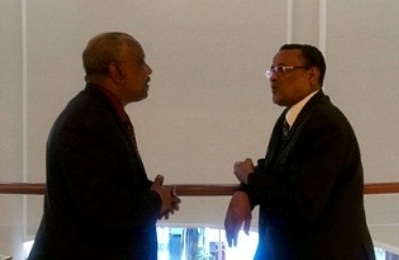SPLM-N proposes formation of “unified Sudanese army”
December 23, 2015 (ADDIS ABABA) – The rebel Sudan People’s Liberation Movement/North (SPLM-N) said it laid out four strategic issues during the recent round of informal talks with the Sudanese government including the formation of a unified “professional Sudanese army”.

In a bid to bridges the gaps, the African Union High Implementation Panel (AUHIP) organized a three-day round of informal talks between the two sides from 16 to 18 December where the two sides debated on how to overcome their differences and agreed to resume discussions in January.
Following end of the talks, the two sides expressed satisfaction with the informal discussions, saying they managed to extend bridges of trust by discussing the outstanding issues openly and seriously.
In a message sent to the movement’s political allies and the civil society organization = seen by Sudan Tribune, SPLM-N secretary general and chief negotiator Yasir Arman assured those who wary that the peace talks would result in a bilateral agreement such as the 2005 Comprehensive Peace Agreement (CPA), saying the movement would not engage in partial agreements.
Arman underscored in his message, which was leaked by some discussion groups on the internet, that the SPLM-N seeks to achieve a comprehensive solution instead of the partial agreements in order to allow all forces to take part in the political process and establish new bases agreed upon by all parties in an inclusive political process.
He said the issue of the Two Areas is closely linked to making comprehensive reforms in the structure of the Sudanese state, stressing the SPLM-N is ready to allow other parties to engage in the talks on the new security and political arrangements in the Two Areas “in conjunction with the dialogue and the comprehensive peaceful solution”.
Regarding the security file, Arman added that “the SPLM-N proposes the formation of a one professional Sudanese army instead of two armies as was the case in the CPA besides making new transitional security arrangements for the SPLA within the framework of reforming and restructuring the unified army”.
It is noteworthy that during all previous rounds of talks on the Two Areas, the Sudanese government demanded a peace agreement that leads to disarm the SPLM-N fighters.
But the rebel group insists on the need to keep its troops during the transitional period of the peace implementation, saying the Disarmament Demobilization and Reintegration (DDR) process can take place once the agreement is fully enforced.
Some analysts believe this SPLM-N position regarding the security file is consistent with its new orientation to abandon the partial agreements and seek a solution for the Two Areas problem within the framework of restructuring the Sudanese state and maintaining its unity on the bases of equal citizenship instead of the right to self-determination.
SPLM-N secretary general further pointed in his message that his movement and the Two Areas by virtue of their history and geographical location could play an important role in restoring the strategic relations with South Sudan and establishing a future that is based upon common interests.
He underscored the need to unify the opposition forces in order to achieve the democratic transformation either through dialogue or by a popular uprising.
“That is why we call upon the “Sudan Call” forces and the entire opposition forces to agree on a unified vision for the dialogue and the [peace] talks and its final outcome and their links to other means [of change],” he added.
(ST)
